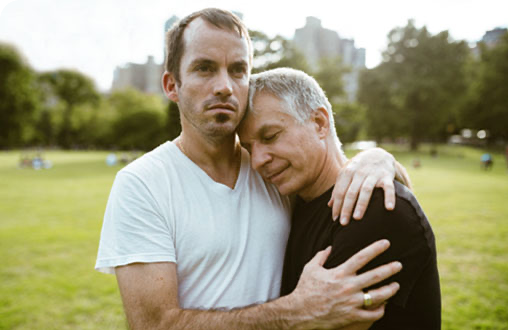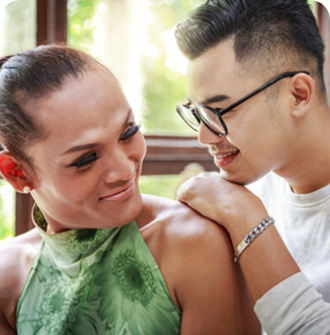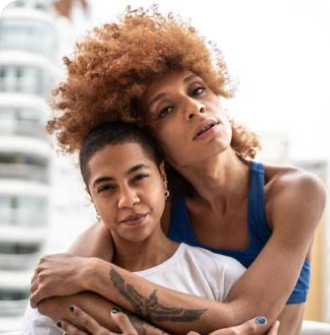The LGBTQ+ Community
Being lesbian, gay, bisexual, transgender, nonbinary, and/or queer is an inherent and natural part of a person’s identity defined by one’s sexual orientation and gender expression. Being LGBTQ+ is not a mental health challenge. Stigma and prejudice as well as traumas like harassment, family rejection, and workplace discrimination, however, can present unique mental health challenges to the LGBTQ+ community. You are not alone, and everyone deserves a safe space to be their true selves. It’s Up to Us has resources that can help. Scroll for more.



5.6% of Americans, over 11 million people, identify as LGBTQ+.28

Lesbian, gay, and bisexual adults are more than twice as likely to experience mental health challenges, often due to political, social, and economic discrimination.29

Transgender adults are nearly four times as likely to experience a mental health challenge, due to stressors such as discrimination, traumatic experiences, and a lack of equal human rights when compared to cisgender adults.30

Stress factors like family rejection and discrimination can take a toll on youth. Lesbian, gay, and bisexual youth are more than twice as likely to say they feel persistent sadness or hopelessness.31

39% of LGBTQ+ people reported having had a mental health challenge in the past year.
San Diego LGBTQ+ Resources That Help
Find LGBTQ+ Inclusive Activities in San Diego
Across San Diego, there are LGBTQ+ activities that can help boost your mental health through community building and sports. Check out the list below for a few local resources currently available in your area.
America’s Finest City Softball League
Founded in 1981, we are San Diego's oldest recreational softball league. With nearly 40 teams and over 600 players, managers, and coaches, we are also San Diego's largest softball league as well as San Diego's largest LGBTQ+ sporting league. Whether you were born with a ball in your hand, or are just learning how to throw, we have a home for you!
Camp Laurel
A free summer camp for trans and nonbinary youth aged 10–17, including free transportation from select locations. The program provides the traditional camping experience while also adding an understanding of issues and needs unique to this community. In addition to the usual camping activities, youth can also select to participate in workshops on trans rights, sex education and healthy relationships, and more.
Different Strokes Swim Team
Different Strokes Swim Team is San Diego's uniquely supportive and welcoming organization benefiting the LGBTQIA+ community to foster fun, well-being, health, and positive experiences through sport, competition, and social events as a member club of United States Masters Swimming.
Front Runners & Walkers San Diego
Front Runners & Walkers is San Diego’s LGBTQ+ running club. The club currently meets weekly on Tuesdays, Thursdays, and Saturdays to walk and run in Balboa Park at 6th Avenue and Laurel Street. We also have a North County group that meets on Saturdays at MaGee Park.
San Diego Gay Men’s Chorus
San Diego Gay Men’s Chorus has more than 300 members and is one of the largest gay choruses in the world. The Chorus connects, inspires, and challenges: our chorus members, by nurturing artistic and personal growth while building a musical family; our audiences, by broadening cultural awareness of important social issues and the bonds that unite us all; and our communities, by serving as a catalyst for individual and social transformation.
San Diego Women’s Chorus
San Diego Women’s Chorus (SDWC) welcomes women, gender nonconforming, nonbinary, and transgender individuals who sing in the soprano/alto (treble) range. As a nonprofit community chorus, SDWC entertains and inspires audiences with music that highlights diverse themes, from human rights to world peace, from environmental harmony to cultural diversity.
& Substance Use Disorders




